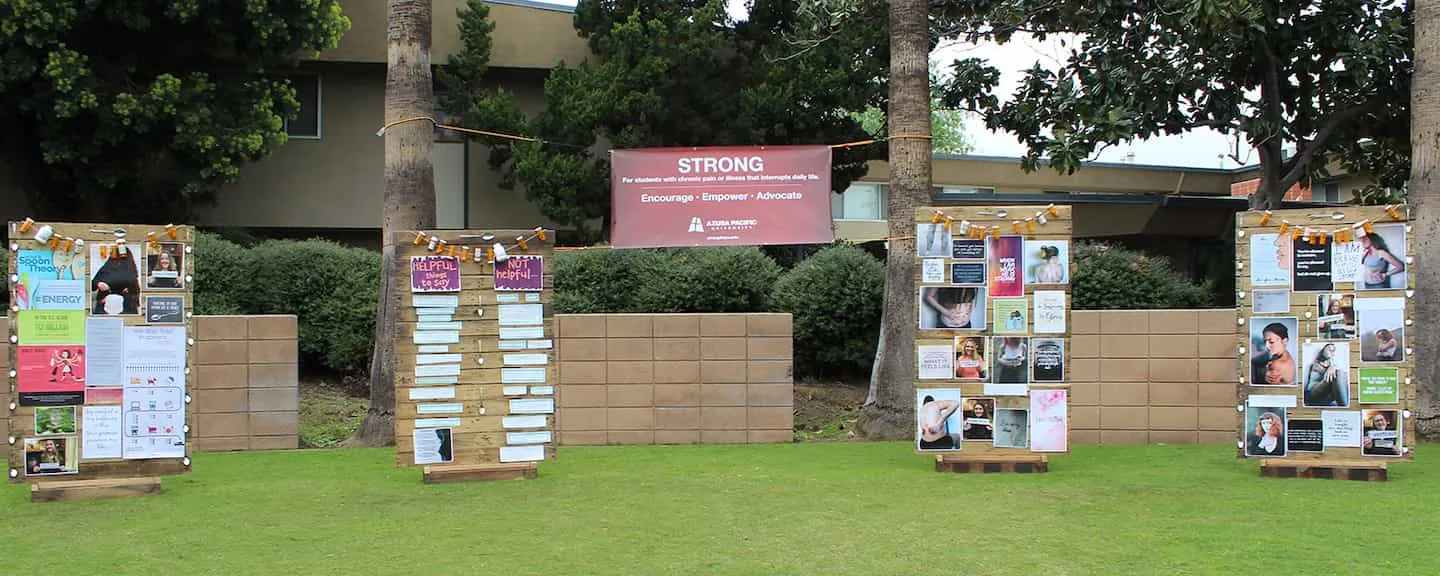- Home
- >
- APU Articles
- >
- News Article
We are STRONG: Living with Chronic Illness in College
January 11, 2020 | Written By Anna Cayot ’20

When I was a freshman in college, I thought I was going to have to drop out. I was falling behind in classes and spent days where I felt so alone that I thought I could not handle it. Being away from my support system at home was especially crippling. Attending college means being around many people who do not understand what it’s like living with chronic illness, making it all the more difficult. Often, people do not take into account that those with disabilities may need extra help. At the time, I didn’t know there were resources at Azusa Pacific for people like me.
The first semester of my sophomore year, things took a turn. One of my professors, Christine Kern, PhD, heard about how sick I was and told me about an on-campus program called STRONG for people with chronic illnesses and disabilities. She even coordinated a ride for me to be able to attend a meeting.
I was honestly hesitant to participate. I had attended support groups in the past that did more harm than good. I did not want to be part of something that would make me feel worse. Luckily, I could not have been more wrong in my assumptions of what STRONG would be.
It was incredible. I was sitting in a room full of other college students going through the same things I was, and suddenly that feeling of loneliness went away. We were able to laugh at things others would never understand. We were able to mourn our health and the losses we face. We were able to truly understand each other. There was an instant sense of belonging I have never felt anywhere else.
Co-founder Heather Peck described our community in an article for The Mighty: “STRONG is a place where [safety] is prioritized—where people can be real and honest and vulnerable. STRONG is a place that is welcoming and confidential. STRONG is a place where all pain is valid … Most of all, STRONG is a place where friends with big parts of our lives in common get together to relate.”
Having someone to relate to is vitally important for those of us living with chronic illness or disabilities as we navigate college. College is a time of transition and upheaval, and most college environments were not created with us in mind. “It is good to know that there are other people on campus with disabilities,” said Bella Cortez ’22. “I still really struggle, but it is good to know that I am not alone.”
As a freshman, Erin Gaffney ’21 said she didn’t have much confidence navigating a college environment, especially as a disabled student. “STRONG helped me by letting me know other students like me existed on campus, and I wasn’t alone in aiming for higher education. It also allowed me to connect to older students who had more experience with illness and disability in college and the support and lessons they gave me proved extremely beneficial.”
Our goal in STRONG is to build each other up and get through college, together. “STRONG is such an amazing part of APU because it focuses on making a part of our APU community—a larger part than most people think—feel seen and heard,” said Meghan Rigali ’20. “I appreciate so much that STRONG is not only available to students with visible disabilities but also to students with invisible ones such as depression and anxiety.”
Of course, we will continue to face challenges beyond those of the average college student. Anna Disser ’23 said, “Being a student with a chronic illness and visible disability is really hard, but not in the way that most people think. I adjusted to juggling both being sick and being a student pretty quickly, but it’s honestly the way that the world views me that makes it the most difficult.” In STRONG, Disser said she can escape the stigma and isolation. “STRONG gives me a community of people who will accept me as a person first and not judge me, because they’ve been judged in the same way by other people. It’s also really nice to have a community where I can talk about accommodation and accessibility issues without having to explain why things are problematic—they just get it.”
STRONG member Chloe Smith ’22 said she has felt included, accepted, and valued. “It has been great having a place I can go where I know people will understand what I’m going through and who are so loving and supportive.”
In STRONG, I also found my people. I made some of the best friends I’ve ever had, and I met my current roommates. In the span of three years, I went from reluctant attender to co-president. These days, I spend my time finding students like the one I was before—students who may be struggling or feeling unable to make it through college on their own. STRONG gives APU students with visible and invisible disabilities a home. Together, we’ve got this.
We are STRONG
STRONG is an on-campus program for students with chronic illnesses and disabilities that interrupt daily life. The program encourages and empowers members, as well as advocates for better resources on campus. STRONG partners with Accessibility and Disability Resources to give students the aid and accommodations they need to thrive at APU.
STRONG meets on Thursdays from 6:30-8:30 p.m. in University Village. Follow STRONG on Instagram for location details and updates.
Join us on Cougar Walk for the APU Student Wellness Fair on Wednesday, February 12, 2020, from 9 a.m.-12 p.m. to meet with professionals and program leaders who are making strides to meet the mental and physical health needs of APU students.